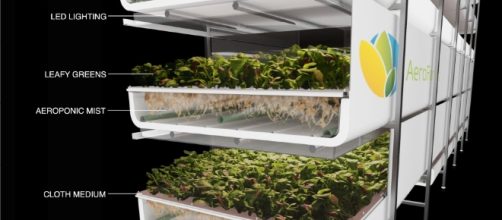Popular Science recently discussed how agricultural technology being developed for settlers on the moon and Mars has the potential to revolutionize farming on Earth. Mars colonists are going to have to grow their food in greenhouses, using hydroponic techniques and LED lights, at least until the Red Planet is terraformed sometime in the distant future. It turns out that some people are trying the same method on Earth in so-called Vertical Farms.
The way vertical farms work is that plants are grown inside a warehouse with every aspect of their environment tightly controlled.
In theory, crop yields would be far greater than they are growing food the old fashion way, subject to the vagaries of sun and rain. In practice, vertical farming is still more expensive than the old fashion kind, but the costs are coming down. The bonus for the technology is that the farms can be located closer to supermarkets and restaurants, thus cutting down on transportation and storage costs.
Vertical farming technology is informative for a new controversy that has cropped up and has been discussed in media as varied as Bill Maher’s “Real Time” and “The Greg Gutfeld Show” that airs on Fox News. Should we colonize Mars or try to save the Earth? The idea is that this is a binary solution set, they we can only do one or the other.
But as the development of indoor or vertical farming shows us, this is a false choice. We can do both because the technology to do one can be applied to do the other.
The false choice fallacy, when applied to space, is nothing new. Back in the 1960s, when astronauts walked triumphantly on the lunar surface, the idea being advanced was that we could explore space or we can help people in poverty but not do both. Those advancing the space vs. poor people meme succeeded in getting the Apollo program curtailed over 40 years ago. Sadly, the poor are still with us and in greater numbers than before.
It could well be that the technology to had to be developed to settle Mars could be used to save the Earth, agriculture just being one of these.
New energy technologies, solar, nuclear, and fusion come to mind. Recycling systems, where waste that on Earth is poured out into the environment, is instead reprocessed and reused, constitute another.
Going back to the moon will grant us access to vast mineral resources that in turn could lead to a space based manufacturing sector, taking environmentally stressful industries off the planet. In effect, Earth would be zoned for residential and light industrial use while heavy industry goes elsewhere where it will not harm the environment.

